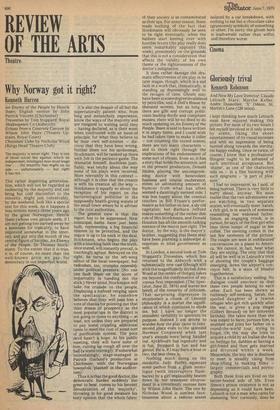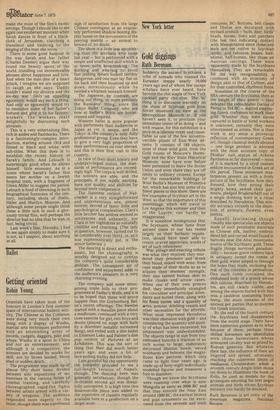Cinema
Gloriously trival
Kenneth Robinson
And Now My Love Director: Claude Lelouch Stars: Marthe Keller, Andre Dussollier, 'X' Odeon, St. _ Martin's Lane (120 mins).
I kept thinking how much Lelouch must have enjoyed making this picture. For most of its two hours I felt myself involved in it only scene by scene, liking the sheer entertainment of its visual excesses and with no impression of being hurried along towards the inevitable happy ending. Once or twice, of course, I knew that a professional filmgoer ought to be ashamed of such uncritical acceptance. But 'shame', as one of the characters tells us — in a film bursting with such epigrams — 'is part of pleasure.'
I had no impression, as I said, of being hurried. There is very little to hurry about, anyway, We soon realise that the two adventurers we are watching, in two separate stories, will eventually meet. Sarah, a rich girl, is in search of someone resembling her widowed father. Simon, an engaging crook, is in pursuit, he says, of the first girl who likes three lumps of sugar in her coffee. The meeting comes in the last few moments of the picture. The couple are seen in exhilarated` conversation on a plane to America. We cannot, in fact, hear what they are saying. The only clue that all will be well is in Lelouch's trick of showing the couple's baggage emerging, down the airport's conveyor belt, in a state of blissful togetherness.
This is a satisfactory ending. No dialogue could convince us that these two people belong to each other. Each has been shown as ruthlessly self-seeking. Sarah, the spoiled daughter of a Jewish refugee who got rich quickly after the war, is given a pop singer (Gilbert Becaud) on her sixteenth birthday. She takes more than she was meant to have, pursues him, is snubbed and joins her father on a round-the-world tour, trying to forget. On the way she tries to acquire a child by an Italian she has no feelings for, dabbles at having a girl-friend and then gets married and divorced within a week. Meanwhile, the boy she is destined to meet is steadily rising from shop-lifting to making films — largely commercials and pornography.
Both these lives are lived on the better-heeled side of life. Even Simon's prison existence is not as depressing as it could have been. Lelouch is not a man who cares for slumming. Nor, curiously, does he make the most of the film's exotic settings. Though I should like to see again one exuberant moment when Sarah dances in front of a blackcloth of Jerusalem, clutching a transistor and listening to the singing of the man she loves.
There is some good humour in the way Sarah and her father (Charles Denner) argue their way round the beauty spots of the world, trundling out immemorable phrases about happiness and love. And when the man dies of a heart attack, I imagine we are supposed to laugh as she says "Daddy couldn't stand my divorce and the six-day war.' Only an appalling egocentric would say such a thing. And only an egocentric would try to renounce some of her father's fortune and give it to his factoryworkers. The workers react delightfully by distrusting such altruism.
This is a very entertaining film, rich in asides and flashbacks. There is a fascinatingly-complex introduction, starting around 1914 and filmed in black and white with sub-titles. What this does is to establish the recent history of Sarah's family. And Letouch is surprisingly good when he allows himself little economy. As in a scene where Sarah's father first meets her mother on a Jewish hospital train, with a fragment of Glenn Miller to suggest the period. Letouch is fond of throwing in such biographical footnotes of the century, including shots of Stalin, Hitler and Marilyn Monroe. And although some people might think these a little sick in such a gloriously trivial film, well perhaps the director had no idea that he was, in fact, being trivial. Last week's film, Stavisky, I had to see again simply to make sure it is not, as I suspect, about anything at all.



































 Previous page
Previous page